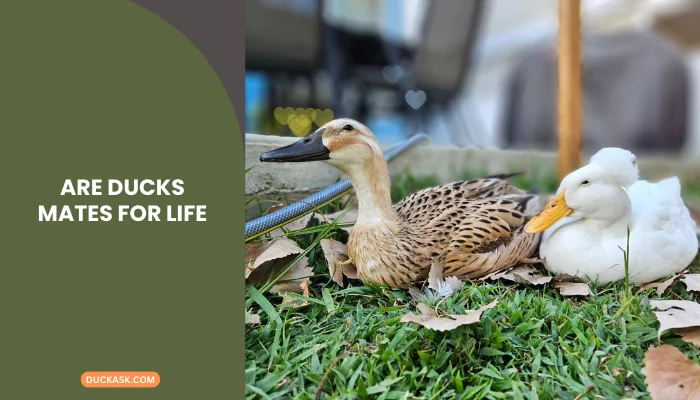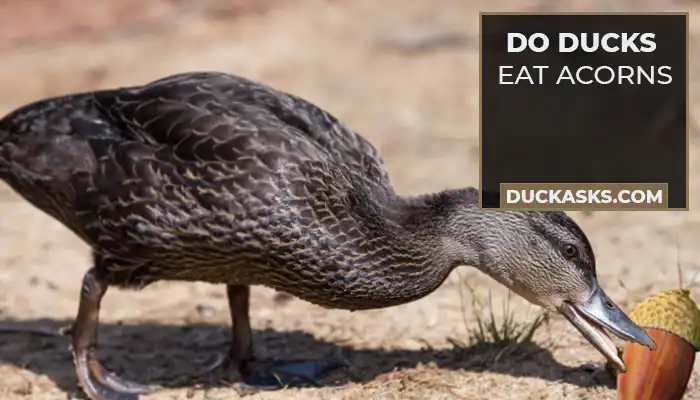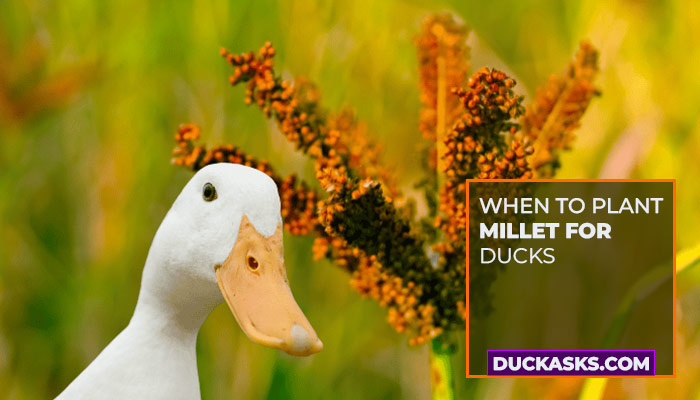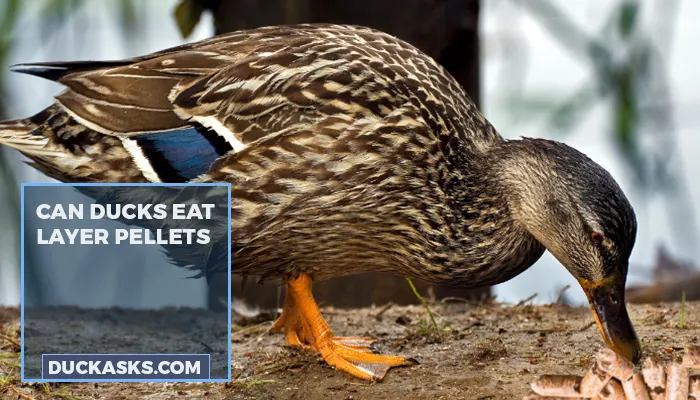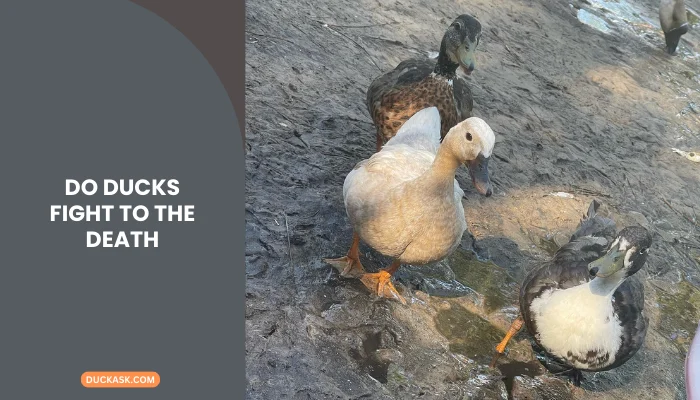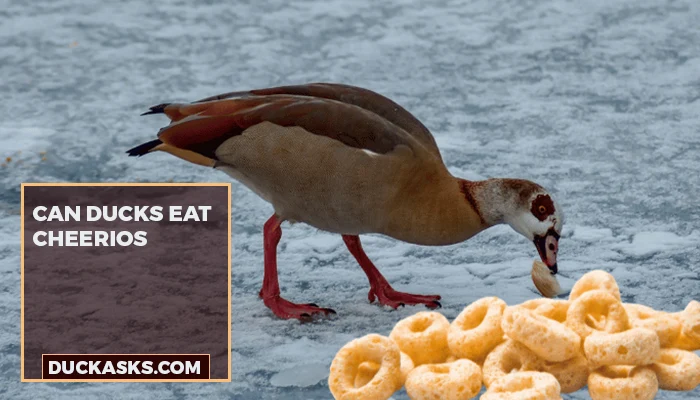What Does It Mean When A Duck Vibrates Its Head?
One of the most common behavioral traits of ducks is to move their heads side by side or up and down whenever they want to indicate something.
So What does it mean when a duck vibrates its head? Ducks vibrate their heads for a number of reasons, which includes shaking off water from their heads and signaling a female duck for mating purposes. Sometimes, ducks vibrate their head when they are sick.
Whatever the reason, it is fascinating to watch ducks bob their heads up and down. However, if this is happening due to medical emergencies, there need to be proper actions taken.
In this article, I will explain why ducks vibrate their head and what to do if the reason is not a favorable one.
Read more about duck behavior:
Why Do Ducks Vibrate Their Heads?
Besides all the other interesting behavioral traits, ducks have an enthralling habit of vibrating their heads. This can mean many things, but they all tell you a specific situation that the ducks are trying to communicate.
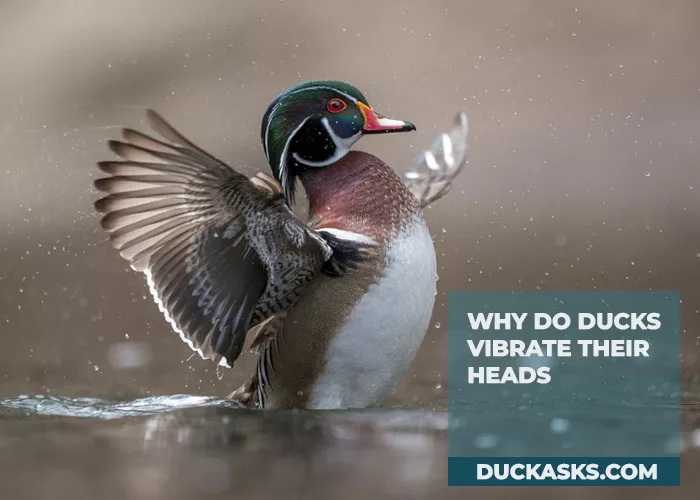
Here are some of the reasons why ducks vibrate their heads.
01. They Show Courtship During Mating
Male ducks will show off their sleek moves when a hen is in front of them. Male ducks are also called drakes, and they will vibrate their heads and tilt their heads to show courtship and invitation to mate.
02. They Are Excited
Ducks will shake their head and vibrate it vigorously if they are excited and happy about a particular subject. Usually when ducks get good treats, both in land and water, they will move their heads in approval.
Ducks also hop around when they are excited if they are on land. In water, they will dive underwater and rise up, and shake the water off their heads.
03. They Are Alerting Other Ducks About Potential Predators
Ducks shake their heads when they feed threatened by an animal or a person. They alert the other ducks in the flock about potential danger by vibrating their heads.
Ducks are always very alert and will use any means necessary to escape a likely predator lurking around to catch them.
04. Shaking off Water From their Heads
When a duck dives into the water, it often comes back up with water droplets on its head and neck. This can be a problem for the duck as it can make its feathers heavy and waterlogged, hindering its ability to fly. To remedy this, the duck will vibrate its head rapidly in order to shake off the excess water.
In addition to shaking off excess water, head shaking also helps to remove any debris or parasites that may have become stuck in the duck’s feathers. This is especially important for ducks that spend a lot of time in the water, as they are more prone to picking up unwanted visitors in their feathers.
What Medical Conditions Cause Ducks to Vibrate Their Heads?
Ducks are known for their unique and often amusing behaviors, and one such behavior is the act of vibrating their heads. While this may seem like a strange and possibly even comical behavior to us, it is actually a common and completely normal behavior for ducks.
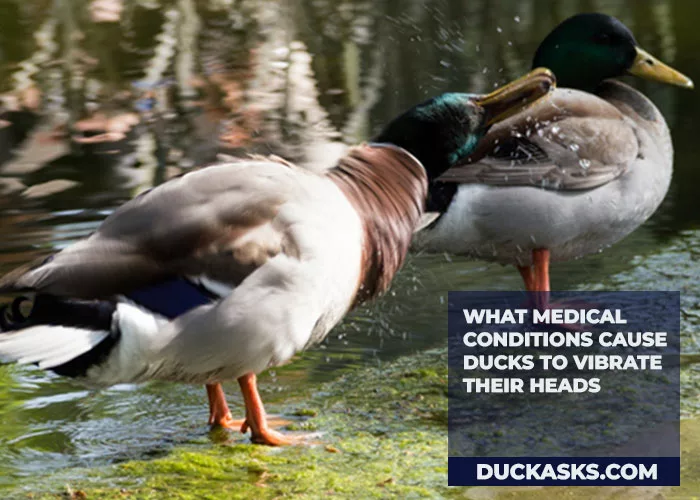
However, in some cases, head vibration can be a sign of a medical condition that requires attention. There are several medical conditions that can cause ducks to vibrate their heads. such as:
01. Infected Preen Gland
The preen gland gives protection to cold by secreting oil to be spread on the thick feathers of a duck’s wings and body.
If the preening gland is not functioning properly, then the oil secreted will not be enough to insulate the duck’s body thoroughly. This may cause the bird to feed cold and shiver when the temperature outside is colder than usual.
At times the preen gland may also produce more oil than required. This has an adverse effect on the plumage of the ducks. This can cause the feathers to fall off, giving even less protection from cold. Thus, the ducks will vibrate their heads in the cold.
02. Hepatitis
Ducks may contract a viral disease known as Hepatitis, which attacks the liver of ducks and causes it to enlarge.
This viral hepatitis is usually rampant amongst ducklings and can be fatal to them if not treated. It is also highly contagious and can easily spread to the other ducklings in the flock.
The early symptom of hepatitis is shivering and shaking of the head, and also trembling of the feet of the ducks. They might also face diarrhea, vomiting and runny discharge through the nose.
Hepatitis is very fatal for ducks and can be lethal within hours. Thus, if any symptom is observed, the duck should be isolated from the rest of the flock and taken immediately to the veterinarian to be checked and given the appropriate treatment.
03. Pneumonia
Ducks can be infected by a parasitic species of fungus called Aspergillus. This fungus can cause pneumonia in ducks.
This disease has many names, duck pneumonia, fungal pneumonia, brooders pneumonia, mycotic pneumonia, among others. It is a respiratory disease which causes the ducks to catch a cold and shiver, shake their heads, and sneeze profusely.
Pneumonia causes the ducks to become weak due to breathing difficulties. The fungus infects the lungs and causes them to be inefficient.
04. Riemerella Anatipestifer Infection
The Riemerella Anatipestifer is a bacterial infection that can cause ducks to catch a cold and shiver in cold. The bacterial infection and fever can be easily treated with an antibiotic, and the ducks can be vaccinated against this bacteria.
A distorted neck, repeated sneezing, appetite loss, and discharges from the nostril and optical regions are other symptoms to look out for, apart from intense shivering.
05. Viral Entiritis
Ducks can contract a viral plague called Entiritis, which can cause ducks to vibrate their heads in cold. Other symptoms include loss of feathers, reduction in the number of eggs produced, runny nose and over drinking water.
The viral Entiritis has no cure as of yet, but some ducks can gain natural immunity against it. However, the symptoms of this plague can persist for up to a year after the duck has been cured.
06. Newcastle Disease
The Newcastle disease can be spread to ducks from chickens. This is a viral fever that affects both the respiratory and the nervous system of ducks.
Due to the limited function of the lungs, the ducks will sneeze and catch a cold.
The nervous system is affected by the limitation of hormonal discharges when the hormone glands become ineffective. This can cause depression, shaking of the head of ducks and also at times paralysis of the body.
07. Bolutism
Bolutism is a waterborne disease that is caused by the bacterium Clostridium Botulinum. This is a toxic substance that impairs the nerves of the ducks and causes disruption and irregularity in body movements.
The impairment of the nervous system means that this bacteria is highly fatal. However, there are available antitoxins that can be used to cure this poisonous disease.
If you notice any shivering, shaking of the ducks head, or light tremors of difficulty in breathing, they should be taken to the nearest veterinarian and given an antitoxin.
What To Do When Your Duck Is Vibrating Its Head?
If you come across your duck vibrating its head vigorously during mating season, there is no need to be alarmed. They are likely just flirting with a hen, and will eventually stop when they receive approval or disapproval.
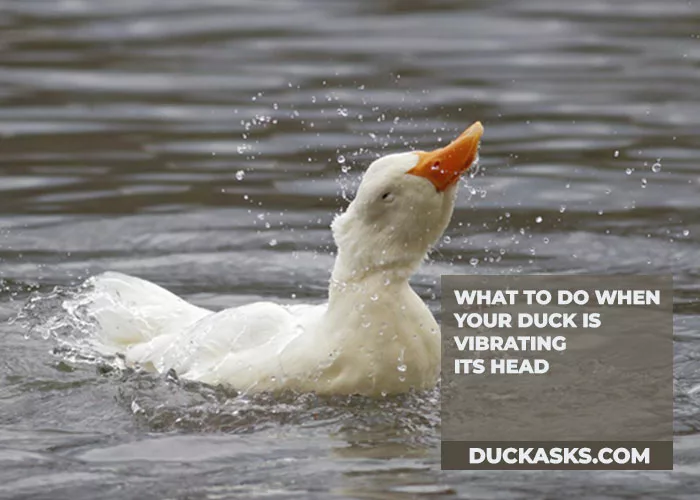
However, if your duck is shivering in the cold, you should immediately visit the veterinarian. The likely cause may be the lack of oil in the ducks feathers due to suboptimal functioning of the preening gland, which is not letting the water in the ducks’ body dry out.
If the duck is vibrating its head in the warm season, then it is likely to have a fungal infection or bacterial attack in some way. The duck should be immediately tested for potential diseases and given the correct medication by consulting a veterinarian.
The Common Behaviors of Ducks
Ducks have a lot of bizarre and entertaining behavioral traits, and vibrating their heads is one of them. Here are some very interesting duck behavior as an individual duck and also as a flock.
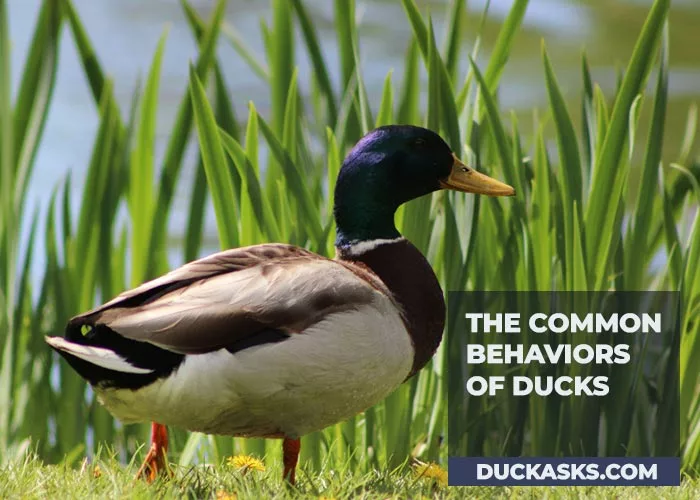
01. Ducks Imprint Upon the First Person They See
Ducks retain the memories of the first few hours of their lives and will imprint upon the very first things that they notice.
This can be their parents in the coop that they hatched in, or the incubator manager in the farm where they were born.
It is very important for you to bond with your ducklings from a very early age if you want them to be friendly and tame.
02. Breeding and Courtship
Ducks are romantic creatures and will often wag their tails when they try to woo the female ducks, commonly called hens. Ducks show courtship in many ways, usually by puffing up their chests and showing off their wings.
When hens approve the romantic gestures, they will move their heads up and down, and invite the duck to mate.
Ducks can mate both in water and out of water in the land areas. However, they prefer to mate in water bodies.
Ducks also flirt in the water by splashing water over the hen with their wings.
03. Duck Gestures Showing Happiness
It is quite fun to see the happiness in ducks. Here are some ways to tell if a duck is happy.
- They will wag their tail feathers whenever they are excited or happy about a particular treat.
- Ducks also tilt their heads to show signs of appreciation or happiness.
- Ducks will bubble the water under them if they are swimming when they are happy about getting a worm or eating a good meal in the water.
04. Sleeping Behavior of Ducks
Ducks sleep by tucking their heads inside their body and covering their eyes with their wings.
The most interesting information about the sleeping behavior of ducks, is that they sleep with one eye closed only. The other eye is usually open for them to detect any predators while they are sleeping.
This is because ducks have what is called “split brains”, where they can keep one part of their brain activated and the other inactive.
05. Preening Their Feathers
Ducks have a very special biological adaptation in the base of their tail. They have what is called a “preening gland” which secretes chemicals to stimulate the hormonal system of ducks.
As soon as a duck gets out of water, they start preening their wings. The preening action is simply the ducks caressing their feathers lightly with their beaks.
The water stuck in the feathers of the ducks are slowly moved away by the action of preening. This action is jumpstarted by the preening gland secreting the oil necessary to act as a water repellant in the feathers.
Final Words
Ducks are adorable creatures and exhibit a number of puzzling behaviors to always fascinate us. I hope you got your answer to the question “What does it mean when a duck vibrates its head”.
Definitely consult a veterinarian if you feel that one of the symptoms of the duck diseases are present in your ducks. Shivering ducks may look like a normal behavior, but health concerns should not be neglected.
If you are interested in learning more about the behavioral patterns of ducks and how to keep your pet ducks healthy, please visit our Facebook, Twitter, and Pinterest. Do share this article if you enjoyed reading it!
Article References:
Image Credits:

